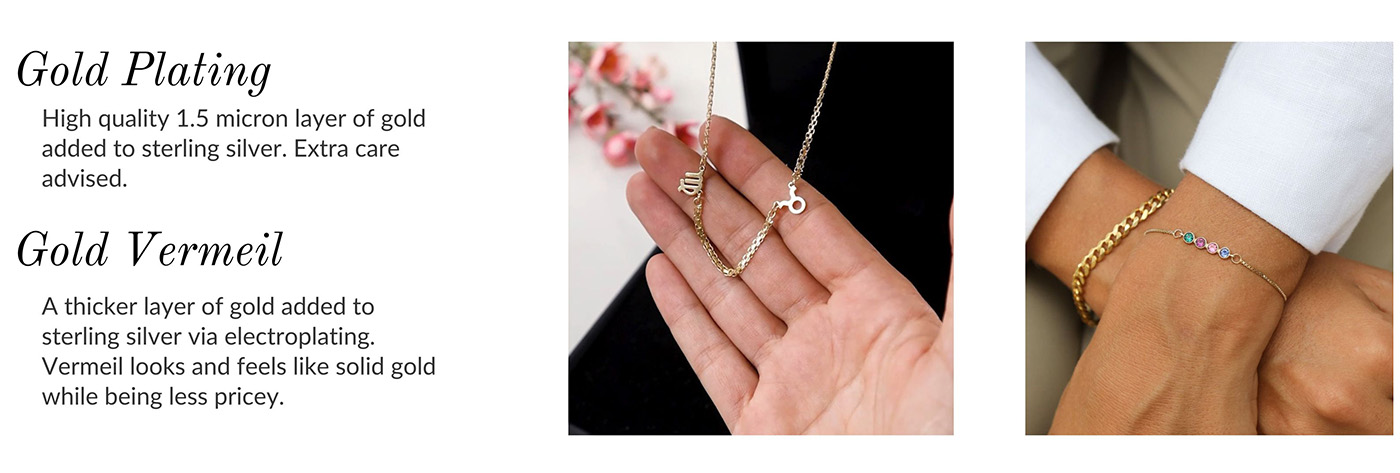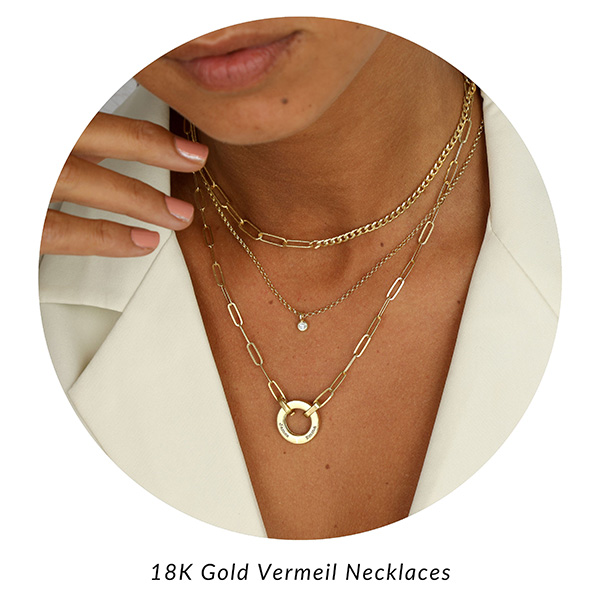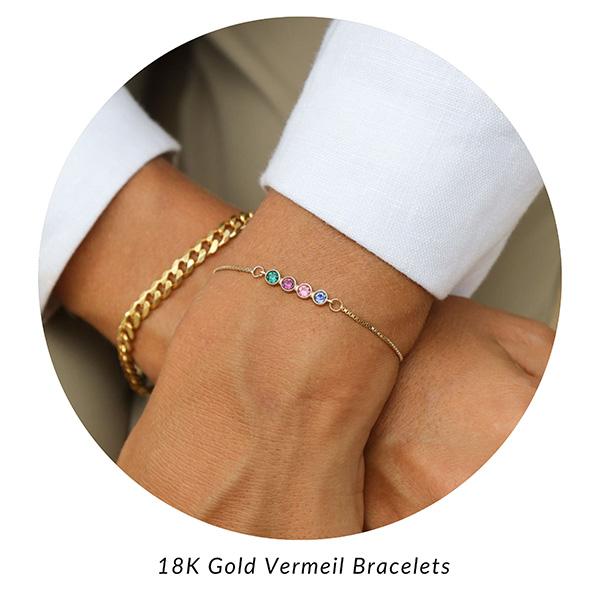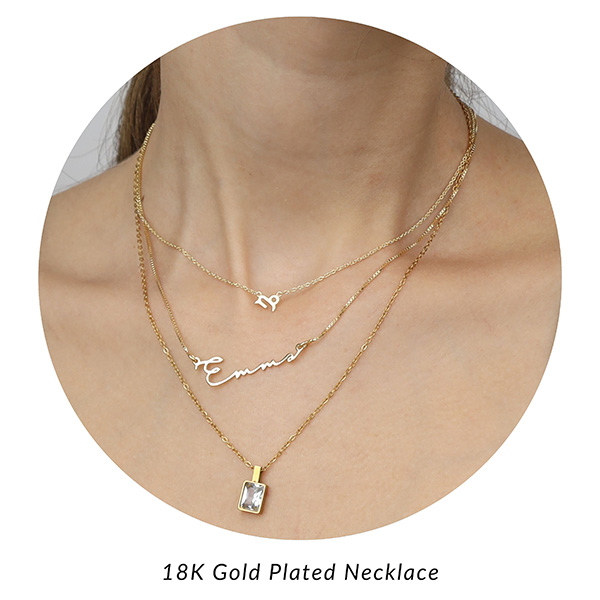Gold Vermeil and Gold Filled: A Guide on Quality, Durability, and Best Selections
Gold Vermeil
Gold vermeil is distinguished from other gold-plated jewelry by its use of sterling silver as the foundational metal. Sterling silver is an alloy of 92.5% silver and 7.5% other metals, which provides the piece with strength and durability.
Benefits of choosing gold vermeil include affordability, a luxurious gold look, and hypoallergenic properties due to the pure silver base. Moreover, this option allows for highly detailed designs due to the softness and flexibility of silver.
Generally, the best quality gold vermeil should have a thick gold layer of at least 2.5 microns, which ensures maximum durability. The purity of the gold used is also essential – quality gold vermeil is made with 10, 14, or 24-karat gold.
With proper care and avoiding exposure to harsh chemicals or moisture, gold vermeil can last several years. However, the gold layer may eventually disappear, revealing the silver underneath.
Gold Filled
In gold-filled jewelry, a base metal, typically brass or copper, is bonded with layers of gold through heat and pressure. This process results in a piece that shares the properties of gold - its hue, luster, and rust resistance - but at a fraction of the cost of solid gold.
Benefits include its strong resistance to rust, tarnish, and discoloration, making it durable for long-term wear. Additionally, the gold doesn't flake or chip off due to the strong bond created during production.
The quality of gold-filled jewelry depends on the ratio of gold to base metal. The Federal Trade Commission requires that gold-filled items contain 1/20th gold by weight overall.
Gold-filled pieces can last up to 30 years or more if properly cared for.
Differences between Gold Vermeil and Gold Filled
Although they both involve the application of gold to a base metal, the base metals used in each process differ, resulting in varying durability, hypoallergenic properties, and thermal conductivity.

Given its thicker gold layer, gold-filled jewelry can handle more wear and tear and is perfect for items like bracelets or rings exposed to rough surfaces.
In general, gold-filled items are more expensive than gold vermeil due to their gold content, but the prices also vary based on design, brand, weight, and gold market price.
Gold vermeil is the safer option for those with allergies to certain metals. PS: This is due to its use of sterling silver, which is less likely to cause allergic reactions than brass or nickel, often used in gold-filled items.
Both gold vermeil and gold-filled jewelry are highly resistant to tarnish. However, over time and with exposure to certain chemicals, they may exhibit signs of tarnish that can be readily cleaned.
It is generally not recommended to wear either in the shower or pool since water and soap can cause the metal to tarnish.
Making the Right Selection
When selecting gold vermeil and gold-filled jewelry, consider your lifestyle, use, sensitivities, and budget. Your style also plays a role since both options offer different aesthetics.
Evaluating craftsmanship involves examining the overall design's finesse and integrating stones or add-ons, clasps, and joints. Good craftsmanship ensures the jewelry piece lasts longer and maintains its aesthetics.
Ideal Occasions for Gold Vermeil and Gold-Filled Jewelry
Gold vermeil, with its high-fashion, elegant finish, is best suited for special occasions. Gold-filled jewelry is more durable and can be a part of daily wearable items.
Depending on the design and your outfit, both types can be mixed and matched for any occasion. They can also be paired with other kinds of jewelry for a stacked or layered look.
Caring for Your Gold Vermeil and Gold-Filled Jewelry
Regular maintenance improves the lifespan of both types. This includes cleaning with a soft cloth after use, storing in airtight containers, and avoiding exposure to harsh chemicals.
Store the pieces in separate pouches or sections of a jewelry box to avoid scratching. Consider professional cleaning for intricate designs.
Beyond the Quality and Durability - Sustainability Concerns and Certifications
While choosing between gold vermeil or gold-filled jewelry, it is also essential to consider the environmental impact of gold mining. The process of extracting gold can lead to environmental degradation and socio-economic issues. As responsible consumers, choosing recycled gold and eco-friendly brands can help contribute to more sustainable practices.
Several certifications and labels, such as Fairtrade Gold, Responsible Jewellery Council (RJC) Chain-of-Custody (CoC), etc., assure that the gold used in the jewelry comes from responsible and ethical sources. When purchasing jewelry, looking out for these labels can be a step towards more responsible buying.
How to Style Gold Vermeil and Gold-Filled Jewelry
Both types of jewelry offer great versatility and can complement different styles. While gold vermeil can be styled for power dressing or to add a pop to casual attire, gold-filled jewelry works great for a minimalist style or stacking trend.
For gold vermeil, since the gold coating can eventually wear off, avoiding pairing it with abrasive materials can help maintain its longevity. Gold-filled jewelry is more brutal, making it a good match with gemstone-add-ons, offering you a luxury feel.
Conclusion: Gold Vermeil vs. Gold Filled - Which is Right for You?
Ultimately, choosing between gold-filled and gold vermeil jewelry comes down to personal preference and lifestyle. Gold-filled might be better if you're hands-on and lead an active life due to its rugged durability. Alternatively, if you have sensitive skin or cherish design detailing, gold vermeil could be your choice. With every choice, ensure that the beauty doesn't merely reside in the aesthetics alone but also in the quality, craft, and journey from the mine to your jewelry box.





